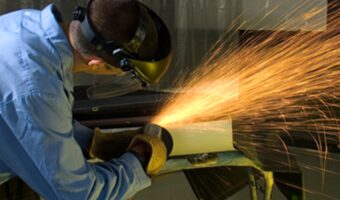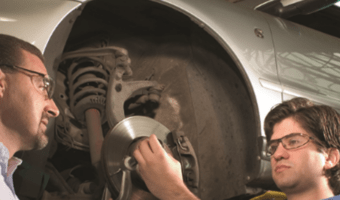Program Overview
Learn the art and science of welding, refinishing, and metal fabrication in a real-world setting at one of the best auto fabrication and refinishing schools in Rhode Island to prepare for careers in the aerospace, automotive, and manufacturing industries.
Our Associate in Science in Advanced Automotive Technology with Fabrication and Refinishing (AAFR) degree provides an in-depth study and application of the most advanced trends in the automotive field.
Students interested in the program gain direct hands-on practice in sheet metal fabrication, auto fabrication, auto body repair, fiberglass fabrication and repair, welding, brazing, cutting, and paint refinishing techniques.
Along with the theory of operation, design, and servicing techniques of current automobile systems, the Fabrication and Refinishing (AFFR) degree program offers two additional terms of study in the fabrication and refinishing of structural surfaces.
Those interested in the programs must have a high school diploma, an equivalent recognized diploma (GED), or meet the federal home school requirements. As they attend class to get the theory and practical knowledge, students also gain exposure to soft skills and resume writing, which helps them get a good job after graduation.
The New England Institute of Technology uses the latest industry standards, up-to-date diagnostic tools, and an Automotive Service Excellence (ASE) approved curriculum in its training program.
Our comprehensive, practical intensive program prepares students for entry-to-industry-level technical capability and skills needed for rapid advancement in automotive servicing, auto body fabrication, and collision repair industries.
According to data from the US Bureau of Labor Statistics (BLS), the states near the east coast are thriving hubs for the automotive industry. Students who attend a trade school are more likely to find meaningful employment.
Read MoreFull Description
The Automotive Technology department offers five automotive associate degree programs:
- Automotive Technology
- Advanced Automotive Technology
- Automotive Technology with High Performance
- Advanced Automotive Technology with High Performance
- Advanced Automotive Technology with Fabrication and Refinishing
While all programs cover the same topics, the Advanced Automotive Technology Fabrication and Refinishing degree includes a more in-depth study of metal fabrication, collision repair, welding, and auto body repair services.
In this program, students will learn the design, theory of operation, and servicing techniques of the systems and system components of the latest cars and automobiles in the first six terms.
Students will receive training in engine construction and design training, engine repair, electricity, electronics, suspension, steering, brakes, transmissions, heating and air conditioning systems, fuel systems, ignition systems, and emission controls.
Graduate students will spend two additional terms of study at the automotive fabrication school. They will learn fabrication, repair and refinishing, use of power tools specific to vehicles and automobiles, sheet metal fabrication, painting, and advanced refinishing.
Our auto metal fabrication/welding school provides training in metal joining and welding techniques such as electric arc welding, oxyacetylene welding, and shielded metal arc welding. The automotive paint school students also learn handling, operation, and care of spray-painting equipment.
The department instructors train students on masking techniques, surface preparation, preparing sprayable materials, preparation and application of different consistencies of paints and primers.
New England Institute of Technology participates in the Ford Maintenance and Light Repair (MLR) program, including Ford Service Technician Specialty Training (STST) in the following areas:
- Electrical Systems
- Climate Control
- Brake Systems
- Steering and Suspension
- Tire
- Chassis & Maintenance
After graduating from the auto fabrication school, students meet the requirements for the Ford MLR certification.
NEIT also participates in the Mopar Career Automotive Program (CAP) LOCAL curriculum, designed and developed by Fiat Chrysler Automotive (FCA) Performance Institute for colleges. The curriculum includes a variety of web-based self-study and instructor-led courses and covers two levels:
Level 0: It provides the basic training, including the technician’s role in the dealership, new vehicle prep, FCA online systems, and the use of diagnostic scan tools.
Level 1: It includes complex training classes such as engine repair and performance, automatic transmissions, driveline, chassis systems, and electrical and body systems. Upon completion, students can work on various vehicles in Chrysler, Jeep, Dodge, and Ram dealerships.
Students will also take a course in OSHA safety standards, enabling them to complete the OSHA-10 certification.
Graduates of the AAFR program are ready to enter a broader range of technician positions in the automotive service, collision repair, and auto body field. Our curriculum provides a strong foundation for students to apply for ASE certificates to enhance their career prospects.
After completing their training, students are eligible to continue for a Bachelor of Science in Business Management with an Automotive Service/Transportation Management (MGTT) concentration and make a career in management.
NEIT participates in several federal and state financial aid programs that can help lower tuition costs for students.
Job Availability in Rhode Island
According to the Bureau of Labor Statistics (BLS) data, automotive fabricators work in motor vehicle body and trailer manufacturing with 230 active personnel in Rhode Island.
The state employs 2,260 other assemblers and fabricators for motor vehicles and parts manufacturing.
NEIT Campus that Offers Auto Body Repair Program
The NEIT campus that offers the auto body repair program is the Access Road Campus, located at 110 Access Rd #65, Warwick, RI 02886.
License Requirements in Rhode Island
In addition to the knowledge acquired, all auto body repair personnel must hold a license to work in the industry. The term for the license is not more than 3 years, after which they have to renew. The types of licenses available are:
- Full collision repair license
- Limited heavy truck and equipment license
- Limited paint, restoration, and customization license
- Special use license
Applicants for a license must submit an application/renewal form, $150 for each year of license renewal, certification of financial responsibility, designation and address, an EPA number, and evidence of compliance with the zonal and state fire, health, and safety laws.
Salary Data in Rhode Island
The data from BLS shows the average wage of $40,360, with those in Rhode Island getting $44,090 per annum. Other assemblers and fabricators earn an annual mean salary of $37,150 per annum or $17.86 per hour.
The neighboring states of Connecticut and Massachusetts offer annual mean wages of $41,520 and $50,420, respectively.
ACCREDITATION STATUS
The NEIT Automotive Technology program has received Master Automobile Service Technology Accreditation by the ASE Education Foundation, 1503 Edwards Ferry Rd., NE, Suite 401, Leesburg, VA 20176, (703) 669-6650
Potential Career Opportunities
After graduating from auto fabrication schools, students can work in multiple avenues. Potential employers include independent garages and dealerships, mass merchandisers, service stations, specialty shops, automotive parts stores, and car rental agencies.
Your program should prepare you to complete a variety of welding certifications that meet the standards of the National Center for Construction Education and Research (NCCER).
Jobs can range from entry-level technicians to owners/operators or managers. Students will work in diverse areas such as sheet metal fabrication and repair, vehicle maintenance, collision repair, auto parts welding, paints and refinishing equipment shop, auto painting, and modifications.
Our Fabrication and Refinishing (AFFR) program graduates will have the following career opportunities:
Automotive Service Technician
Collision Repair Technician
Generation Technician
Heavy Equipment Mechanic
Light Wheel Mechanic
Shop Foreman
Quality Control Inspector
Operation Supervisor
Parts Manager
Trailer Mechanic
FAQs
-
What is auto fabrication?
Auto fabrication is the process of building auto parts, structures, and exterior modifications. The process uses cutting, bending, machining, welding, and grinding to create finished auto products from scratch.
-
What does a car fabricator do?
A car fabricator works in cutting, grinding, welding, and assembling auto parts and structures. Fabricators may also work in pure metal fabrication processes such as forging, smithing, and rolling.
-
What are the types of metal fabrication?
Fabrication methods fall into the following categories:
- Metal Forming: Forging, Rolling, Drawing, Extrusion
- Sheet Metal Operations: Cutting, Punching, Shearing, Perforating, Notching, etc.
- Machining: Turning, Milling, Shaping, CNC, etc.
- Casting: Die Casting, Investment Casting, etc.
- Metal Joining: Welding, Brazing, Soldering, etc.
We select a fabrication method depending on the part geometry, strength requirements, type of materials, and the intended application.
-
What is fabrication work?
Fabrication refers to the process of building metallic and non-metallic parts, structures, and machines from raw materials. It involves creating metal, wood, and plastic parts using casting, molding, cutting, forging, turning, milling, etc.
-
What Is Refinishing in Automotive Work?
Automotive refinishing is a process of custom painting automobiles. It starts with cleaning any anomalies in the bare metal body, followed by applying body filler, sanding, priming, and painting. The process ends with clear coat protection and final wet sanding if required. The vehicles could include cars, motorcycles, vans, and trucks.
-
What Is a Custom Fabrication for Cars?
Custom fabrication of cars entails building bespoke parts for the interior, exterior, or engine. It is typical for vehicles no longer in production, especially the vintage collection. In these cases, the car owner cannot find a parts supplier to purchase off the shelf.



